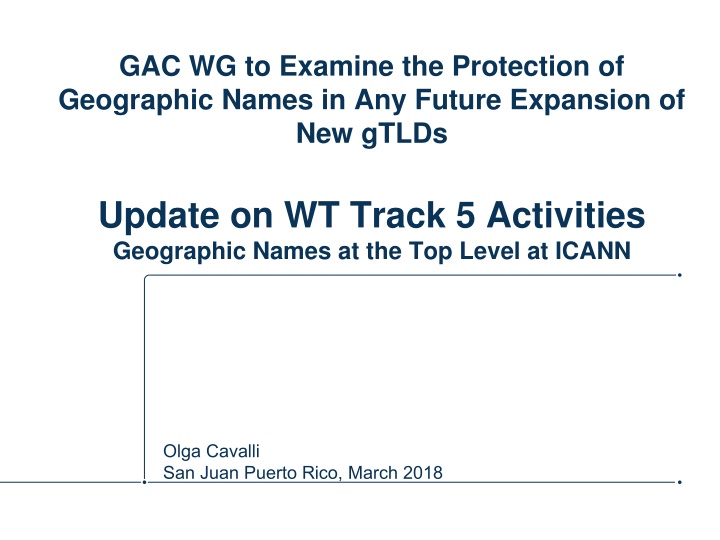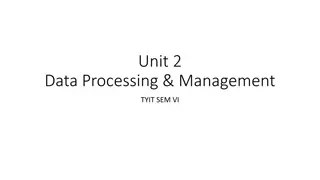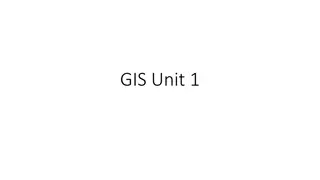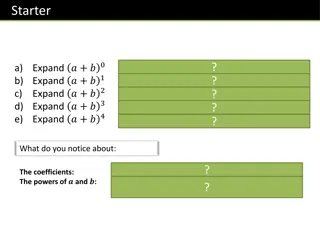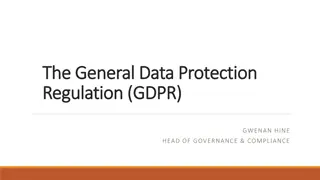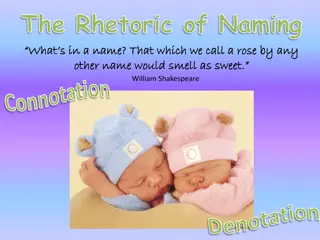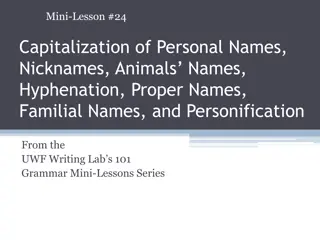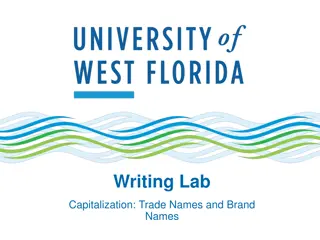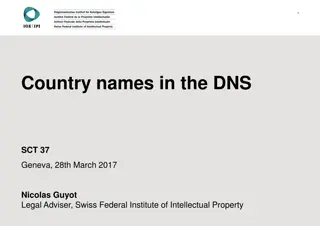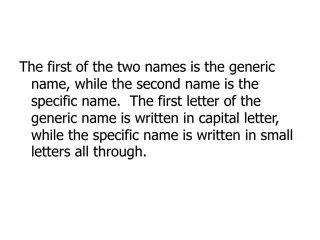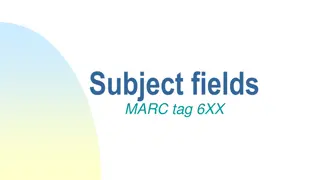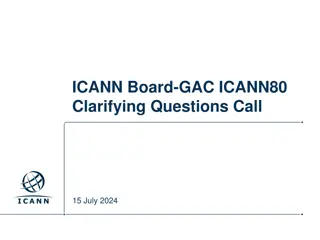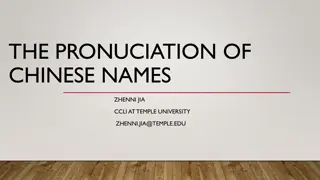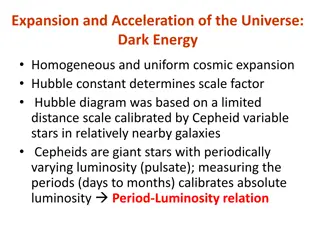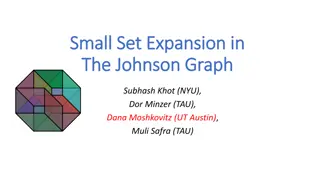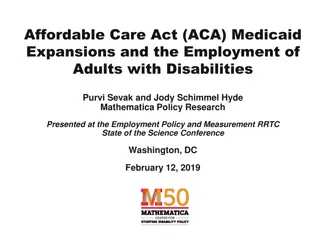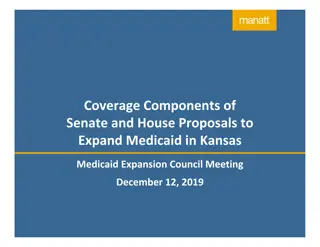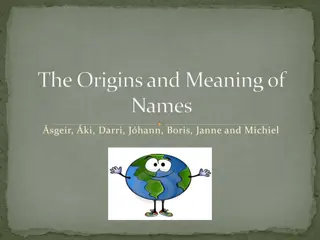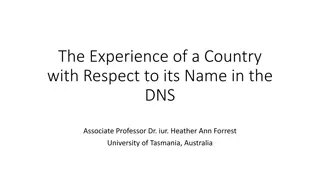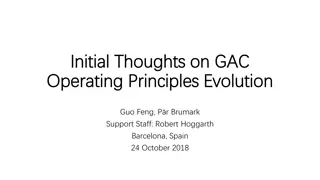GAC Working Group on Geographic Names Protection in New gTLD Expansion
The GAC Working Group is focused on improving protections for geographic names in future gTLD expansions. They aim to develop practical options and rules to reduce uncertainties for governments, communities, and applicants using geographic or community names. The group seeks to engage local communities, governments, and stakeholders early on to minimize risks and delays in new gTLD applications.
Uploaded on Sep 10, 2024 | 4 Views
Download Presentation

Please find below an Image/Link to download the presentation.
The content on the website is provided AS IS for your information and personal use only. It may not be sold, licensed, or shared on other websites without obtaining consent from the author.If you encounter any issues during the download, it is possible that the publisher has removed the file from their server.
You are allowed to download the files provided on this website for personal or commercial use, subject to the condition that they are used lawfully. All files are the property of their respective owners.
The content on the website is provided AS IS for your information and personal use only. It may not be sold, licensed, or shared on other websites without obtaining consent from the author.
E N D
Presentation Transcript
GAC WG to Examine the Protection of Geographic Names in Any Future Expansion of New gTLDs Update on WT Track 5 Activities Geographic Names at the Top Level at ICANN Olga Cavalli San Juan Puerto Rico, March 2018
GAC WG to Examine the Protection of Geographic Names in Any Future Expansion of New gTLDs Objective: This internal GAC working group is reviewing and considering any necessary improvements to existing protections by: Developing practical options that are aimed at improving protection of geographic names during any future expansion of gTLDs. Developing practical suggestions and rules to lower uncertainties both for the governments, communities and also for the applicants, once using a geographic or community name. Developing best practice rules to avoid misuse of geographic and community names as new gTLDs and at the same time lowering uncertainties for the applicants, trademarks and the business involved. To ensure the involvement of local community, Government and other relevant stakeholders in the initial stage to avoid future risks and delays for such new gTLDs applications. Mainly focused in those names with geographic significance which are NOT included in any of the lists considered in the AGB or future similar documents. Considering a proposal on a repository of terms with geographic significance. Additional information is available on the WG section of the GAC website. | 2
Current Status of Work Track 5 Work Track 5 (WT5) is a sub team operating within the GNSO New gTLD Subsequent Procedures Policy Development Process Working Group. The WT began meeting in November 2017. The WT currently has 145 members and 82 observers from across the ICANN community and four co-leaders representing the ALAC, ccNSO, GAC, and GNSO. The WT recently agreed on a Terms of Reference document which describes the WT s goals, objectives, scope, deliverables, and rules of engagement. The WT is beginning discussion on which of the terms listed in 2.2.1.4 in the AGB 2012 that shall be considered geographic in the future rounds. The next major deliverable for the group will be a work plan outlining milestones and steps to reach these milestones. | 3
Recent activities of Work Track 5 Drafting of Terms of Reference Webinar on 8 February: background on the history. Present work: Discuss and compare the definitions and treatment of geographic terms included in the 2007 GNSO policy and the final Applicant Guidebook issued in 2012. For each type of string, the group considered the following questions: Is it a valid geographic term for the purposes of new gTLDs? What were the positive impact/merits based on the treatment applied to the term in the AGB? What were the negative impact/opportunities lost based on the treatment applied to the term in the AGB? Input received has been captured in a working document. WT members are encouraged to provide additional input. WT5 will meet face-to-face WG session at ICANN61. | 4
New gTLD Subsequent Procedures PDP WG Work Track 5 Terms of Reference (TOR) Section I: Work Track Identification WG Chartering Organization: New gTLD Subsequent Procedures PDP Working Group Names of WT Co-Leads: Olga Cavalli (GAC) Annebeth Lange (ccNSO) Martin Sutton (GNSO) Javier Rua Jovet (ALAC) PDP Working Group Chairs: Jeff Neuman & Cheryl Langdon-Orr WT Workspace URL: https://community.icann.org/x/YASbAw WT Mailing List: gnso-newgtld-wg-wt5@icann.org | 5
ToR hightlights: Context and Objectives The PDP WG Co-Chairs have established a fifth Work Track that focuses exclusively on the topic of geographic names at the top level. It is structured to encourage broad and balanced participation from different parts of the community and includes joint community Work Track leadership. WT5 leadership is coordinated by the PDP WG Co-Chairs. 1. While this PDP is already open for anyone to participate, like all GNSO PDPs, the PDP WG Co-Chairs are seeking to structure conversations about geographic names in a way that (i) leads to predictable, reliable and sustainable subsequent procedures for the submission of new gTLD applications, (ii) is sensitive to the needs and concerns of all community members, and (iii) ensures that participants feel comfortable that the process is sufficiently inclusive. 2. | 6
ToR hightlights: Scope 1. Work Track 5 will focus on developing proposed recommendations regarding geographic names at the top level, including both ASCII and IDN forms. WT5 will (i) consider what constitutes a geographic name in the specific context of the New gTLD Program; (ii) analyze (a) 2007 GNSO Policy Recommendations on the Introduction of New Generic Top-Level Domains; and (b) relevant rules contained in the 2012 Guidebook, such as the Geographic Names Review procedure, Geographic Names Extended Evaluation, and Objection Procedures; and (iii) take into account previous work related to geographic names that the community may have completed. 2. Broader discussions about the remit of SOs and ACs, as well as the allocation of second and third level geographic domains are specifically out of scope for this Work Track. | 7
ToR hightlights: Deliverables Develop a work plan, including a timeline for activities and deliverables. Reach consensus on potential policy recommendations and/or implementation guidance regarding geographic names at the top level. Following the process set up for the existing Work Tracks, it will deliver proposed recommendations and related rationale (i.e., Initial Report) to the full Working Group for consideration and possible adoption as PDP WG recommendations. Consensus levels for all recommendations will be determined per the decision-making section established in the ToR. The full Working Group will publish the Initial Report for public comment. All comments received will be passed on to Work Track 5 for due consideration and any changes as appropriate. Work Track 5 s Final Report and recommendation will be delivered to the full Working Group | 8
ToR hightlights: Decision-making Full consensus: no one speaks against the recommendation Consensus: a position where only a small minority disagrees, but most agree. Strong support but significant opposition: a position where, there are a significant number of those who do not support it. Divergence (also referred to as No Consensus): a position where there isn't strong support for any particular position, but many different points of view. Minority View: refers to a proposal where a small number of people support the recommendation. This can happen in response to a Consensus, Strong support but significant opposition, and No Consensus; or, it can happen in cases where there is neither support nor opposition to a suggestion made by a small number of individuals. | 9
ToR hightlights: Decision-making Full consensus: no one speaks against the recommendation Consensus: only a small minority disagrees, but most agree. Strong support but significant opposition: a position where, there are a significant number of those who do not support it. Divergence (also referred to as No Consensus): there isn't strong support for any particular position, but many different points of view. Minority View - refers to a proposal where a small number of people support the recommendation. This can happen in response to a Consensus, Strong support but significant opposition, and No Consensus; or, it can happen in cases where there is neither support nor opposition to a suggestion made by a small number of individuals. | 10
ToR hightlights: WT5 membership GNSO: 53 GAC: 23 ccNSO: 19 Individuals: 25 RSSAC: 1 Details about full list of WT 5 members and observers: https://community.icann.org/pages/viewpage.action?pageId=71604562 | 11
Review of existing defined geographic names Discussion points: a) is it a valid geographic term for the purposes of new gTLDs? b) what were the positive impact/merits based on the treatment applied to the term in the AGB? c) what were the negative impact/opportunities lost based on the treatment applied to the term in the AGB? Summary of terms open document: https://docs.google.com/spreadsheets/d/1FuPEq0y- cdSUQ1nvhWKhVnG8PLaC2RYXsCpQu91FDqo/edit#gid=358523414 | 12
2.2.1.3.2 DNS Stability: String Review Procedure Alpha-2 code listed in the ISO 3166-1 standard Example: AF for Afghanistan Policy (2007 PDP): Not available as gTLD. Two- character ASCII strings are not permitted, to avoid conflicting with current and future country codes based on the ISO 3166-1 standard. Implementation (2012 AGB): Not available as gTLD. Two- character ASCII strings are not permitted, to avoid conflicting with current and future country codes based on the ISO 3166-1 standard. a) is it a valid geographic term for the purposes of new gTLDs? b) what were the positive impact/merits based on the treatment applied to the term in the AGB? c) what were the negative impact/opportunities lost based on the treatment applied to the term in the AGB? | 13
2.2.1.4.1 Country or Territory Names Alpha-3 code listed in the ISO 3166-1 standard Examples: AFG for Afghanistan Policy (2007 PDP): Available, but challenge mechanism to governments to initiate an objection. Applicants should be aware of GAC Principles. Applicants must represent that the use of the proposed string is not in violation of the national laws in which the applicant is incorporated. Implementation (2012 AGB): Not available as gTLD. a) is it a valid geographic term for the purposes of new gTLDs? b) what were the positive impact/merits based on the treatment applied to the term in the AGB? c) what were the negative impact/opportunities lost based on the treatment applied to the term in the AGB? | 14
2.2.1.4.1 Country or Territory Names Long-form name in the ISO 3166-standard, or a translation of the long-form name in any language Example: The Islamic Republic of Afghanistan Policy (2007 PDP): Available, but challenge mechanism to governments to initiate an objection. Applicants should be aware of GAC Principles. Applicants must represent that the use of the proposed string is not in violation of the national laws in which the applicant is incorporated. Implementation (2012 AGB): Not available as gTLD. a) is it a valid geographic term for the purposes of new gTLDs? b) what were the positive impact/merits based on the treatment applied to the term in the AGB? c) what were the negative impact/opportunities lost based on the treatment applied to the term in the AGB? | 15
2.2.1.4.1 Country or Territory Names Short-form name in the ISO 3166-standard, or a translation of the short- form name in any language Example: Afghanistan Policy (2007 PDP): Available, but challenge mechanism to governments to initiate an objection. Applicants should be aware of GAC Principles. Applicants must represent that the use of the proposed string is not in violation of the national laws in which the applicant is incorporated. Implementation (2012 AGB): Not available as gTLD. a) is it a valid geographic term for the purposes of new gTLDs? b) what were the positive impact/merits based on the treatment applied to the term in the AGB? c) what were the negative impact/opportunities lost based on the treatment applied to the term in the AGB? | 16
2.2.1.4.1 Country or Territory Names Short- or long- form name association with a code that has been designated as "exceptionally reserved" by the ISO 3166 Maintenance Agency Reserved for a particular use at special request of a national ISO member body, governments or international organizations. Example: UK reserved for United Kingdom. Policy (2007 PDP): Available, but challenge mechanism to governments to initiate an objection. Applicants should be aware of GAC Principles. Applicants must represent that the use of the proposed string is not in violation of the national laws in which the applicant is incorporated. Implementation (2012 AGB): Not available as gTLD. a) is it a valid geographic term for the purposes of new gTLDs? b) what were the positive impact/merits based on the treatment applied to the term in the AGB? c) what were the negative impact/opportunities lost based on the treatment applied to the term in the AGB? | 17
2.2.1.4.1 Country or Territory Names Separable component of a country name designated on the "Separable Country Name List," or is a translation of a name appearing on the list, in any language, according to annex in AGB Example: A land, separable component of A land Islands. See AGB Annex for a list. Policy (2007 PDP): Available, but challenge mechanism to governments to initiate an objection. Applicants should be aware of GAC Principles. Applicants must represent that the use of the proposed string is not in violation of the national laws in which the applicant is incorporated. Implementation (2012 AGB): Not available as gTLD. a) is it a valid geographic term for the purposes of new gTLDs? b) what were the positive impact/merits based on the treatment applied to the term in the AGB? c) what were the negative impact/opportunities lost based on the treatment applied to the term in the AGB? | 18
2.2.1.4.1 Country or Territory Names Permutation or transposition of any of the names included above. Permutations include removal of spaces, insertion of punctuation, and addition or removal of grammatical articles like "the." A transposition is considered a change in the sequence of the long or short form name, for example, RepublicCzech or IslandsCayman. Policy (2007 PDP): Available, but challenge mechanism to governments to initiate an objection. Applicants should be aware of GAC Principles. Applicants must represent that the use of the proposed string is not in violation of the national laws in which the applicant is incorporated. Implementation (2012 AGB): Not available as gTLD. a) is it a valid geographic term for the purposes of new gTLDs? b) what were the positive impact/merits based on the treatment applied to the term in the AGB? c) what were the negative impact/opportunities lost based on the treatment applied to the term in the AGB? | 19
2.2.1.4.1 Country or Territory Names A name by which a country is commonly known, as demonstrated by evidence that the country is recognized by that name by an intergovernmental or treaty organization Example: Holland for the Netherlands Policy (2007 PDP): Available, but challenge mechanism to governments to initiate an objection. Applicants should be aware of GAC Principles. Applicants must represent that the use of the proposed string is not in violation of the national laws in which the applicant is incorporated. Implementation (2012 AGB): Not available as gTLD. a) is it a valid geographic term for the purposes of new gTLDs? b) what were the positive impact/merits based on the treatment applied to the term in the AGB? c) what were the negative impact/opportunities lost based on the treatment applied to the term in the AGB? | 20
2.2.1.4.2 Other Geographic Names A representation, in any language, of a capital city name of any country or territory listed in ISO 3166-1 Examples: London-Londres-Llundain / Berlin-Berlijn-Berlino Policy (2007 PDP): Available, but challenge mechanism to governments to initiate an objection. Applicants should be aware of GAC Principles. Applicants must represent that the use of the proposed string is not in violation of the national laws in which the applicant is incorporated. Implementation (2012 AGB): Requiring support/non-objection from relevant governments or public authorities. a) is it a valid geographic term for the purposes of new gTLDs? b) what were the positive impact/merits based on the treatment applied to the term in the AGB? c) what were the negative impact/opportunities lost based on the treatment applied to the term in the AGB? | 21
2.2.1.4.2 Other Geographic Names City name, used for purposes associated with the city name Examples: Bath, Florence, Frankfurt Policy (2007 PDP): Available, but challenge mechanism to governments to initiate an objection. Applicants should be aware of GAC Principles. Applicants must represent that the use of the proposed string is not in violation of the national laws in which the applicant is incorporated. Implementation (2012 AGB): Requiring support/non-objection from relevant governments or public authorities. a) is it a valid geographic term for the purposes of new gTLDs? b) what were the positive impact/merits based on the treatment applied to the term in the AGB? c) what were the negative impact/opportunities lost based on the treatment applied to the term in the AGB? | 22
2.2.1.4.2 Other Geographic Names City name, used for other purposes Examples: Bath, Florence, Frankfurt, Spa Policy (2007 PDP): Available, but challenge mechanism to governments to initiate an objection. Applicants should be aware of GAC Principles. Applicants must represent that the use of the proposed string is not in violation of the national laws in which the applicant is incorporated. Implementation (2012 AGB): No requirements. a) is it a valid geographic term for the purposes of new gTLDs? b) what were the positive impact/merits based on the treatment applied to the term in the AGB? c) what were the negative impact/opportunities lost based on the treatment applied to the term in the AGB? | 23
2.2.1.4.2 Other Geographic Names Exact match of a sub-national place name, such as a county, province, or state listed in ISO 3166-2 Example: Badakhsh n (AF-BDS) in Afghanistan Policy (2007 PDP): Available, but challenge mechanism to governments to initiate an objection. Applicants should be aware of GAC Principles. Applicants must represent that the use of the proposed string is not in violation of the national laws in which the applicant is incorporated. Implementation (2012 AGB): Requiring support/non-objection from relevant governments or public authorities. a) is it a valid geographic term for the purposes of new gTLDs? b) what were the positive impact/merits based on the treatment applied to the term in the AGB? c) what were the negative impact/opportunities lost based on the treatment applied to the term in the AGB? | 24
2.2.1.4.2 Other Geographic Names String listed as a UNESCO region or appearing on the Composition of macro geographical (continental) regions, geographical sub-regions, and selected economic and other groupings list Examples: Africa, Northern Africa Policy (2007 PDP): Available, but challenge mechanism to governments to initiate an objection. Applicants should be aware of GAC Principles. Applicants must represent that the use of the proposed string is not in violation of the national laws in which the applicant is incorporated. Implementation (2012 AGB): Requiring support/non-objection from at least 60% of the respective national governments in the region and no more than 1 written statement of objection from relevant governments or authorities. a) is it a valid geographic term for the purposes of new gTLDs? b) what were the positive impact/merits based on the treatment applied to the term in the AGB? c) what were the negative impact/opportunities lost based on the treatment applied to the term in the AGB? | 25
Geographical names not specifically mentioned in AGB Definitions: The definitions included in the 2012 AGB in general worked well. However, problems in the application of the AGB 2012 related to geonames as Top Level Domains have arisen in relation to those names with a geographic meaning/significance that were not covered under the 2012 AGB rules (ej: .amazon ). Suggestion to include in this definition discussion, the notion that there were names with geographic meaning not covered by the 2012 AGB definitions and rules, which according to a factual analysis have given rise to problems, and that therefore a debate would be warranted, in order to include them under the definitions in a manner to be agreed upon, establishing a framework for mutually agreed outcomes amongst all interested parties in such applications. Treatment: According to the available data (for instance the data circulated prior to the webinar organized in April last year) the 2012 AGB requirement of a non-objection letter by the relevant public authorities worked well, as it created a good mix of incentives for applicants and relevant authorities to arrive at mutually accepted solutions for the delegation of the strings. | 26
GAC involvement in WT 5 Decision making process and GAC involvement Active participation of GAC members Main concerns for GAC members Comments? Questions? | 27
